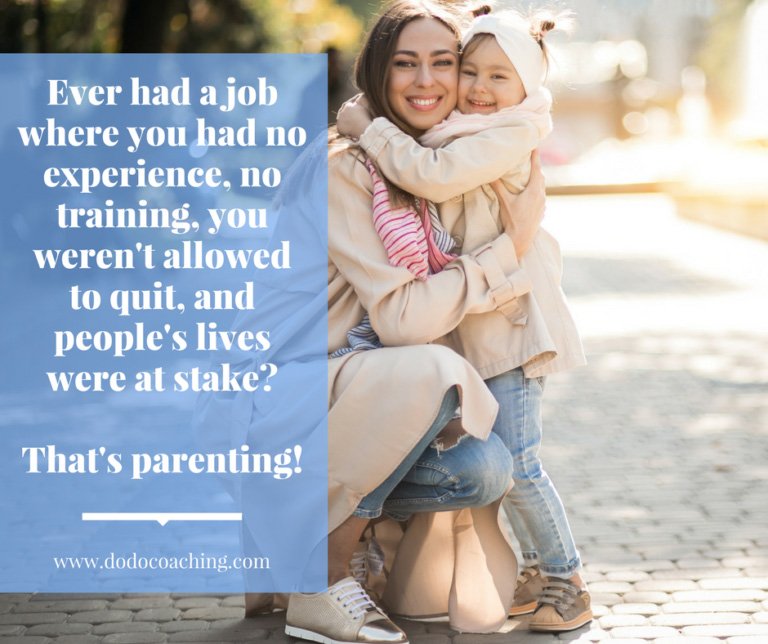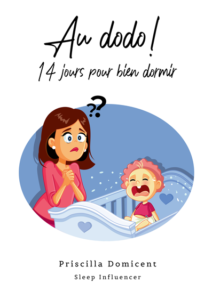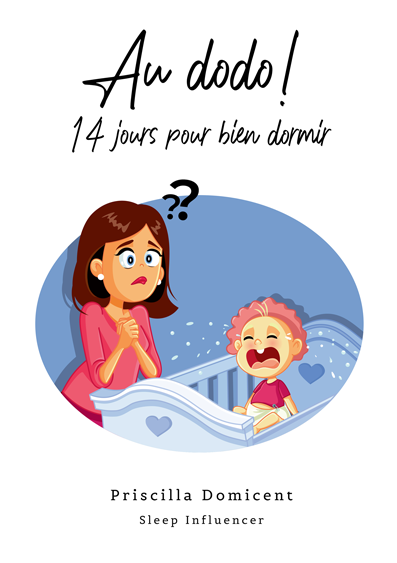When my first daughter was born, I was totally clueless about a baby’s sleep, feeding needs or even how often diapers had to be changed. In short, I was a real amateur in all fields related to parenting! I definitively needed a crash course in baby care. I love the following quote illustrating my state of mind.

None of my close friends or family members had kids. So, I could only rely on my instincts, a couple books and some blog posts.
As moms, we are encouraged to focus on the magic of parenting and the perfect birth. However, there is not enough emphasis on realities we are facing – exhaustion, anxiety, sleep deprivation or breastfeeding challenges.
Looking back, I wish I had read and received more information from baby sleep professionals about baby’s sleep patterns, cues and habits. My child’s first weeks (even the first couple months) were exhausting. I was struggling to keep up. Sleep had become a foreign country; a place that I happily visited some time ago. During that period, I would have traded anything to get a couple more hours of sleep here and there.
As a Certified Sleep Coach and a former bleary-eyed parent, I feel that it is my duty to share the basics about baby sleep habits. I want to give you the opportunity to be better prepared (than myself) as a new parent.

1. Newborns party at night and sleep during the day
The rhythm of a newborn’s life is quite simple. She spends her days eating or sleeping – up to 17 hours a day! Babies come into the world with reverse sleep cycles. They are very active during the night. Actually, pregnant women already experience a peak in activity in the evenings. When they are up and walking around, the movements rock the baby to sleep. On the contrary, when the mom lies down to rest, the fetus often wakes up and is ready to play.
From birth until about 2 months of age, there is absolutely no distinction between day and night for a little one. After the 6 first weeks, a baby’s melatonin production, the hormone regulating the circadian rhythm, starts to kick in and by 5 or 6 months of age, her internal clock should be fully developed.
By getting in tune with their circadian rhythm, babies develop a natural sleep-wake cycle that is more in line with the parental 24-hour schedule. Your role can be decisive in helping your baby to get a good circadian rhythm.
Here are some ways to resolve your baby’s day / night confusion:
- Try not to leave her in dark rooms during the day. Go out to get some sunlight. Do some stimulating activities and talk to her while she is eating.
- Babies should benefit from a well-established sleep routine. Try to start the routine as early as possible in your baby’s life.
- Settle things down in the evening to set the stage for sleep. During the feedings or diaper changes, do not talk to her and keep the light intensity as low as possible. As soon as your night activities are over, put her back down in bed.
- Attend to the baby’s needs and avoid letting her cry for too long at night. Crying leads the release of a stress hormones (cortisol). This hormone secretion makes it more difficult for a baby to fall back asleep and to establish a healthy sleep pattern in a longer run. Picking up and attending to your baby when she is crying won’t spoil her. According to the New York Post, “new research has found that cuddled children grow up to be healthier, less depressed, kinder, more empathetic, and more productive adults.”
Related post: Sleep myth #2: Never Wake A Sleeping Baby
2. A baby’s sleep is unpredictable (until you use a baby tracker)
According to the Daily Mail, new parents lose about 44 days of sleep the first year following their baby’s birth. On average, they only get to sleep 5.1 hours per night. Even if babies sleep between 14 and 17 hours per day during their first 3 months of life, they wake up every 2 to 3 hours to be fed. Disrupted sleep can lead to shortened attention span and impaired critical thinking for parents. The effects of fragmented sleep goes beyond a tired body; it also affects how you think and cope.
Starting a sleep log is the best way to undercover your baby’s sleep and feeding patterns as well as her cues. It will also help you :
- keep track of how much overall sleep your baby is getting in 24 hours,
- know how sleep is divided up between naps and night,
- determine the amount of wake-up time between naps
- organize night feedings,
- see the evolution of sleep needs over time,
- spot any inconsistencies or health problems.
Before starting to help parents sleep coach their child, I always recommend keeping a baby tracker in order to share valuable information with me. I have created this blank worksheet to give you the opportunity to take notes.
![]()
Related post: 6 Reasons Why A Baby Tracker Is Essential
3. Babies are capable to sleep through noise
People assume that becoming a parent requires ninja skills. Your new flexible moves probably demonstrate your sense of creativity. However, the trouble is that floorboards creak, trucks outside your house honk and neighbors can be loud.
Do babies actually need a completely silent environment to fall asleep and stay in Morpheus’ arms? Nope! In the womb, fetuses hear their parents’ voice, the whooshing of blood flowing through the mom’s arteries and even music. Can you imagine that they are hearing noise 24/7 and as loud as a vacuum cleaner? Sleeping in a quiet environment could actually make it harder for babies to sleep. They are just not used to silence.
The popular devices called “white noise machines” promise to help infants fall asleep and stay asleep by soothing them with constant sound. Some machines even have a heartbeat setting mimicking the mother, which is (supposedly) even more comforting for newborns.
There is no need for you to rush to a baby store or to log in on Amazon to get a fancy white noise machine. The regular sound of a fan can also do the trick.
Related post: A Sleeping Baby Needs Complete Silence
4. Babies have their own temperament
Every child is born with a unique temperament. Babies have their own characteristics and patterns of behavior influencing how they respond to everyday events. This is called temperament. Temperament actually means behavioral style or the manner in which the child interacts with the environment. It determines how your child expresses and manages emotions.
There are 9 temperament treats:
- Activity: measures how active a child is on a regular basis.
- Rhythmicity: measures how regular or predictable an infant is.
- Approach / Withdrawal: defines an infant’s initial reaction to something new.
- Adaptability: measures how easily a child can adjust to new circumstances or a change in routines.
- Intensity: measures the degree of an infant’s response to stimuli; whether pleasant or unpleasant.
- Mood: defines a child’s direction taken in response to the degree of intensity to a situation.
- Persistence: measures how long an infant engages in activity.
- Distractibility: determines how easily a baby may be distracted by external events.
- Treshold: measures how much stimulus is required to produce a response in the infant in specific circumstances.
When it comes to sleep coaching, the most important temperament trait is ADAPTABILITY. Your baby’s level of adaptability will determine how quickly she will adapt to changes in her schedule and routine.
Your role as parent is to understand your child’s specific temperament in order to understand her needs. In fact, a child’s personality plays a huge role in her sleeping habits and how she responds to sleep coaching.
- An easy baby is easy-going, very adaptable, social, reaches milestones on cue, easy to calm and tends to fall into natural schedules without much parental intervention.
- A fussy baby is stubborn, prefers her own company, cries as if it is the end of the world, is insightful, resourceful, wise and very independent.
- A high needs baby is intense, draining, demanding, unsatisfied, unpredictable, super sensitive, extremely active, very reactive to noise and light. She also needs constant attention and a secure environment.
- A slow-to-warm baby is sensitive, shy, thoughtful, cautious, needs time to get used to a new environment, prefers order and predictability and has major meltdowns when forced to do something.
- An alert baby is very active, social, physical, willful, determined, prone to temper tantrums, pays attention to very small details, shows difficulties to manage emotions and needs strong boundaries.
Related post: How Temperament Affects A Spirited Baby’s Sleep
Different temperaments will lead to different sleep strategies. There is no one-size-fits-all approach when it comes to sleep coaching.
An easy child will smoothly follow the flow and accept a new schedule or routine with little rebellion. On the other hand, a fussy, high needs or alert baby will be less easy to sleep coach. The slow-to-warm-up babies can be difficult since they find it hard to adjust to new situations. They tend to get upset with changes in routine and do not react favorably to “surprises”.
Keep in mind that consistency is the most important success factor when it comes sleep coaching, especially with a slow-to-warm-up baby.
5. Babies should sleep in a boring and safe environment
Is it time for you to decorate the baby nursery? How exciting!
The first advice I would give you is to think like a minimalist. Your child’s bed should be a place to rest, not to play. Create a zero-accumulation and clutter-
Cover or turn off any source of light such as an alarm clock, a nightlight and a camera indicator light.
In addition, it is best not to hang a frame or shelf directly above your child’s bed to avoid unwanted objects falling on her, which could hurt her or wake her.
Finally, approximately 3,500 infants die annually in the United States from sleep-related deaths, including Sudden Infant Death Syndrome (SIDS). The American Academy of Pediatrics shares several recommendations on creating a safe sleep environment. The quality and safety of the items in the bedroom must be checked. Shopping for the arrival of a new family member is an unforgettable experience. In order to avoid any risk, go through the following check list.
6. Wait a minute
I just finished the AMAZING book Bringing up Bébé providing parenting insights gleaned by an American mother living in France. The author, Pamela Druckerman, is amazed by the fact that French babies sleep through the night as early as two months of age. She describes the French parents’ philosophy with the concept of “La Pause”.
The Guardian summarizes her theory about La Pause as follows: “Waiting is the key: the French do not do instant gratification. It starts more or less at birth. When a French baby cries in the night the parents go in, pause, and observe for a few minutes. They know that babies’ sleep patterns include movements, noises and two-hour sleep cycles, in between which the baby might cry. Left alone it might “self-soothe” and go back to sleep. If you dash in like an Anglophone and immediately pick your baby up, you are training it to wake up properly. But if a French baby does wake up and cry properly on its own, it will be picked up. Result? French babies often sleep through the night from two months. Six months is considered very late indeed.”
As a Certified Sleep Coach, I have met anxious mothers that could not stand hearing their child crying. Their first instinct was to run to their baby’s side at the first sound of a cry. In fact, by invading the child sleep space and making physical contact, parents end up really waking up their child. Some parents decide to abandon sleep coaching because the tiny little tears are unbearable to see.
As difficult (or crazy) as it may sound, I urge parents to pause before running to the nursery. Babies can be vocal when transitioning between sleep cycles (which are more likely to be 50 to 60 minutes long rather than 2 hours as described by Pamela Druckerman) while napping and during the night. I suggest that parents try to relax and wait a minute or two before rushing into the bedroom. This will give the baby the opportunity to learn how fall back asleep without any assistance.
If you would like to get more information on how to improve the quality and / or the quantity of your child’s sleep (and yours at the same time), do not hesitate to schedule a 15-minute preliminary consultation. It is a totally FREE & NON-BINDING offer!










